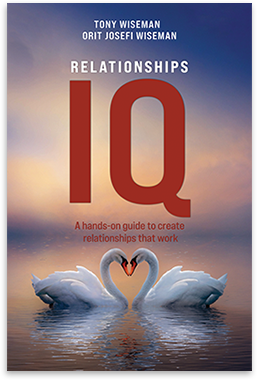
ORIT AND I WENT TO THE OPERA RECENTLY
Orit and I went to the opera recently. Once again, we
were enthralled by the beauty of one of the most popular operas of all time and
one of our favourites, Verdi’s La Traviata.
The music is intoxicating. But for the first time, the story got me thinking.
It deals with a traditional Italian-operatic theme, the bitter end to
’undying love’. It should actually be ‘dying love’ because, in the
dramatic finale, the tragic heroine, Violetta, dies in the arms of
the love of her life, Alfredo, as do the heroes or heroines so often
in many operas. Oh! Eterrnal love, denied again to the star-crossed
lovers. As a result, I decided to take the risk of expressing my personal
outlook on the subject, which I know probably flies in the face of accepted public
opinion.
It is not my intention to be controversial. In advance, I plead not guilty. It
is simply that I believe that this approach can save many relationships, which
may be floundering. It could also add quality to those that are not but where
the couple have reached a cease-fire or stalemate.
Probably the most often heard of the many reasons people quote as the cause of
a breakdown in their intimate relationship is that it is not what it used to
be. It is not fun anymore. The sex is not as passionate nor as frequent as it
was. Communication has dried up. Simply said, we are no longer in love. We
have fallen out of love.
The problem is that in many cases, they were probably not ‘in love’ in the
first place. Perhaps they thought they were. It may have felt like it. It may
have even looked like it at times. But that doesn’t mean that they were. They
were probably just in effect of the ‘pleasant feelings’ usually experienced at
the start of a new romance. In all likelihood, they never ‘fell in love’
although, for example, they may have ‘fallen in lust’.
We have been brainwashed, conditioned to think the
Hollywood version of love is the real thing. It is immortalized as
such in music, especially in pop songs, literature, opera, poetry and different
forms of art, etc. If that idea was the real thing, then love would
really last forever. The trouble is that nothing could be further from the
truth. In fact, the relationship can endure, forever, but not the feelings.
Fortunately, NO feelings, good or bad last forever. Imagine if it were so. When
you feel bad, you would always continue to feel bad. Horrible to
contemplate. If you feel good, you would soon take it for granted and it would
no longer feel so good. You would probably become bored and the buzz would disappear
even more so.
The reason is that human beings are creatures of
stimulus-response. In our lives, we are constantly exposed to our environment,
the prevailing circumstances as we experience them personally and individually.
We automatically react to these conditions through our often unconscious
interpretation of them and the stories we tell ourselves about them. Our
stories then become our reality. These ideas, thoughts, beliefs, which is all
they really are, affect the way we feel. Most of us then behave or act in
accordance with the way we feel at any moment, feel bad, behave negatively,
feel good, act positively. Since all of this is going on automatically, it is
as though we have no control over our feeling or actions.
Actually, we do have complete control, at least over our
attitude and therefore, over our behaviour. We are not prisoners of our
emotions although they do have a huge influence over us. We have choice as to
how to react and what to do in any given situation. Often, it might be in direct
conflict with what we may be feeling but nonetheless, we have the option, ‘what
to do!’ Racism, bigotry or prejudice are just examples of people accepting
their preconceived ideas, never questioning them and acting in accordance with
them. The filter through which they experience life is dictated by their
beliefs and governs their attitude and behaviour.
Regarding relationships, we fail to make a crucial distinction between being
in love and being loving. As I postulated earlier on, in the first
case, being in love is dependent on our feelings, which fluctuate,
often wildly, as we know. Being loving, though, has nothing to do with those
feelings. It is a choice, a commitment to be loving and to act in accordance
with that commitment. Loving is a value we choose, which demands from us to
behave consistently with our ideas of what it means to be loving. Perhaps, do
unto others as you would have them do unto you, in a nutshell.
Obviously, it is easy to be loving when we feel like it. It is far harder to be
loving when our entire being seems to be telling us not to. Yet, to form
stable, lasting relationships, it is essential to be loving in the latter
situation, too, perhaps even more so. It requires the ability to have a sense
of humour, to be be fair, to be willing to see the opposite side’s point of
view, to be compassionate and above all, to be forgiving. All these are
admirable traits, which will make us better human beings, anyway. I will deal
with forgiveness in a later blog.
So, when we do not feel in love, it does not mean
we cannot be loving and act accordingly any more than when we feel
in love, we actually are.
Post Views : 153